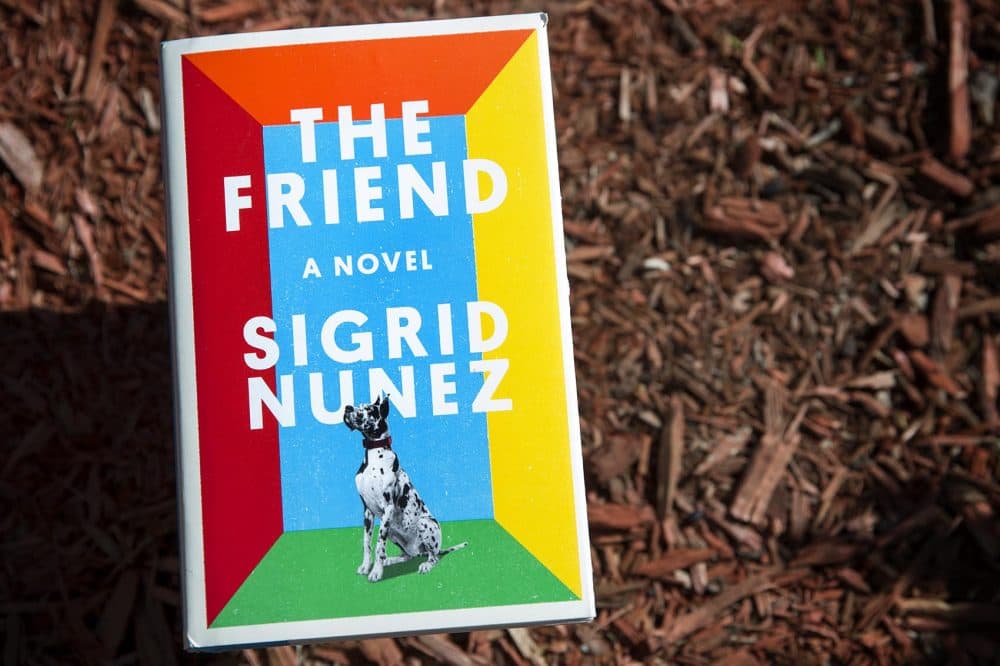Advertisement
'The Friend' Tells Tale Of Shared Grief, Complicated Friendships And Goodness Of Dogs
Resume
The 2018 National Book Award winner for fiction is "The Friend," by Sigrid Nunez.
Her novel follows the story of a writer living in Manhattan, who's come into the care of a massive Great Dane named Apollo after her former professor, mentor, and one-time lover commits suicide.
Guest
Sigrid Nunez, author of "The Friend."
Book Excerpt: "The Friend"
By Sigrid Nunez
Part One
During the 1980s, in California, a large number of Cambodian women went to their doctors with the same complaint: they could not see. The women were all war refugees. Before fleeing their homeland, they had witnessed the atrocities for which the Khmer Rouge, which had been in power from 1975 to 1979, was well known. Many of the women had been raped or tortured or otherwise brutalized. Most had seen family members murdered in front of them. One woman, who never again saw her husband and three children after soldiers came and took them away, said that she had lost her sight after having cried every day for four years. She was not the only one who appeared to have cried herself blind. Others suffered from blurred or partial vision, their eyes troubled by shadows and pains.
The doctors who examined the women—about a hundred and fifty in all—found that their eyes were normal. Further tests showed that their brains were normal as well. If the women were telling the truth—and there were some who doubted this, who thought the women might be malingering because they wanted attention or were hoping to collect disability—the only explanation was psychosomatic blindness.
In other words, the women’s minds, forced to take in so much horror and unable to take more, had managed to turn out the lights.
This was the last thing you and I talked about while you were still alive. After, only your email with a list of books you thought might be helpful to me in my research. And, because it was the season, best wishes for the new year.
There were two errors in your obituary. The date you moved from London to New York: off by one year. Misspelling of the maiden name of Wife One. Small errors, which were later corrected, but which we all knew would have annoyed the hell out of you.
But at your memorial I overheard something that would have amused you:
I wish I could pray.
What’s stopping you?
He is.
Would have, would have. The dead dwell in the conditional, tense of the unreal. But there is also the extraordinary sense that you have become omniscient, that nothing we do or think or feel can be kept from you. The extraordinary sense that you are reading these words, that you know what they’ll say even before I write them.
It’s true that if you cry hard enough for long enough you can end up with blurred vision.I was lying down, it was the middle of the day, but I was in bed. All the crying had given me a headache, I’d had a throbbing headache for days. I got up and went to look out the window. It was winter yet, it was cold by the window, there was a draft. But it felt good—as it felt good to press my forehead against the icy glass. I kept blinking, but my eyes wouldn’t clear. I thought of the women who’d cried themselves blind. I blinked and blinked, fear rising. Then I saw you. You were wearing your brown vintage bomber jacket, the one that was too tight—and looked only better on you for that—and your hair was dark and thick and long. Which is how I knew that we had to be back in time. Way back. Almost thirty years.
Where were you going? Nowhere in particular. No errand, no appointment. Just strolling along, hands in pockets, savoring the street. It was your thing. If I can’t walk, I can’t write. You would work in the morning, and at a certain point, which always came, when it seemed you were incapable of writing a simple sentence, you would go out and walk for miles. Cursed were the days when bad weather prevented this (which rarely happened, though, because you didn’t mind cold or rain, only a real storm could thwart you). When you came back you would sit down again to work, trying to hold on to the rhythm that had been established while walking. And the better you succeeded at that, the better the writing.
Because it’s all about the rhythm, you said. Good sentences start with a beat.
You posted an essay, “How to Be a Flâneur,” on the custom of urban strolling and loitering and its place in literary culture. You caught some flak for questioning whether there could really be such a thing as a flâneuse. You didn’t think it was possible for a woman to wander the streets in the same spirit and manner as a man. A female pedestrian was subject to constant disruptions: stares, comments, catcalls, gropes. A woman was raised to be always on guard: Was this guy walking too close? Was that guy following her? How, then, could she ever relax enough to experience the loss of sense of self, the joy of pure being that was the ideal of true flânerie?
You concluded that, for women, the equivalent was probably shopping—specifically, the kind of browsing people do when they’re not looking to buy something.
I didn’t think you were wrong about any of this. I’ve known plenty of women who brace themselves whenever they leave the house, even a few who try to avoid leaving the house. Of course, a woman has only to wait until she’s a certain age, when she becomes invisible, and—problem solved.
And note how you used the word women when what you really meant was young women.
Lately I’ve done a lot of walking but no writing. I missed my deadline. Was given a compassionate extension. Missed that deadline, too. Now the editor thinks I’m malingering.
I was not the only one who made the mistake of thinking that, because it was something you talked about a lot, it was something you wouldn’t do. And after all, you were not the unhappiest person we knew. You were not the most depressed (think of G, of D, or T-R). You were not even—strange as it now sounds to say—the most suicidal.
Because of the timing, so near the start of the year, it was possible to think that it had been a resolution.
From THE FRIEND by Sigrid Nunez. Published by arrangement with Riverhead Books, an imprint of Penguin Publishing Group, a division of Penguin Random House LLC. Copyright © 2018 by Sigrid Nunez.
This article was originally published on December 11, 2018.
This segment aired on December 11, 2018.

